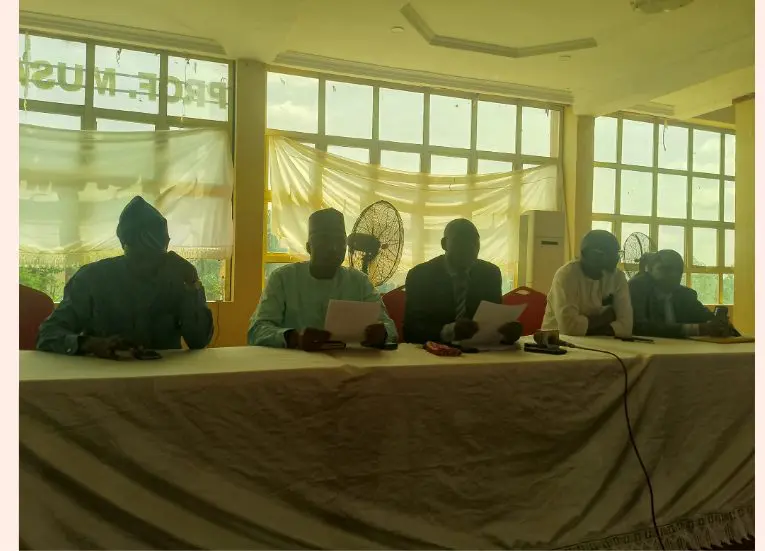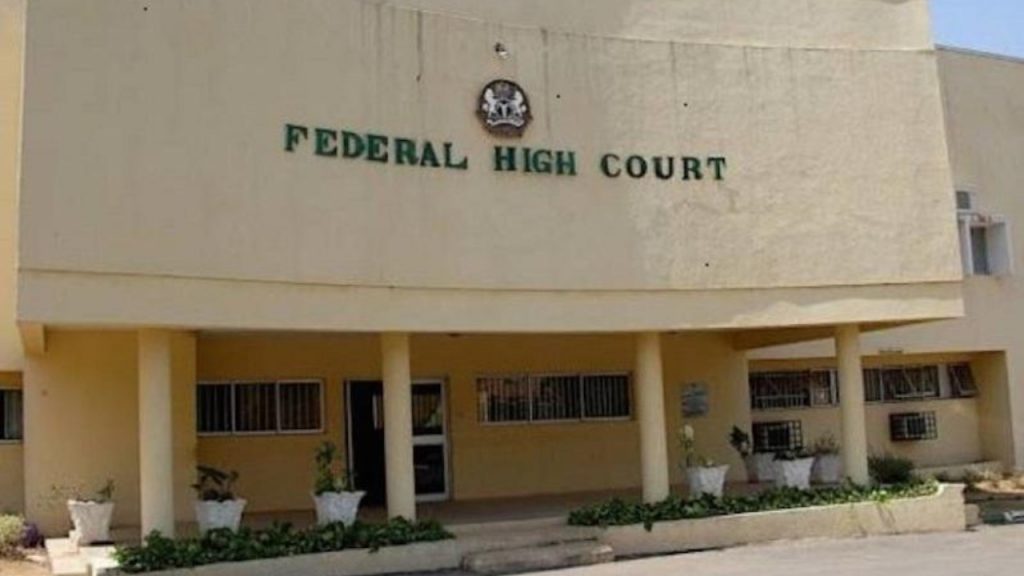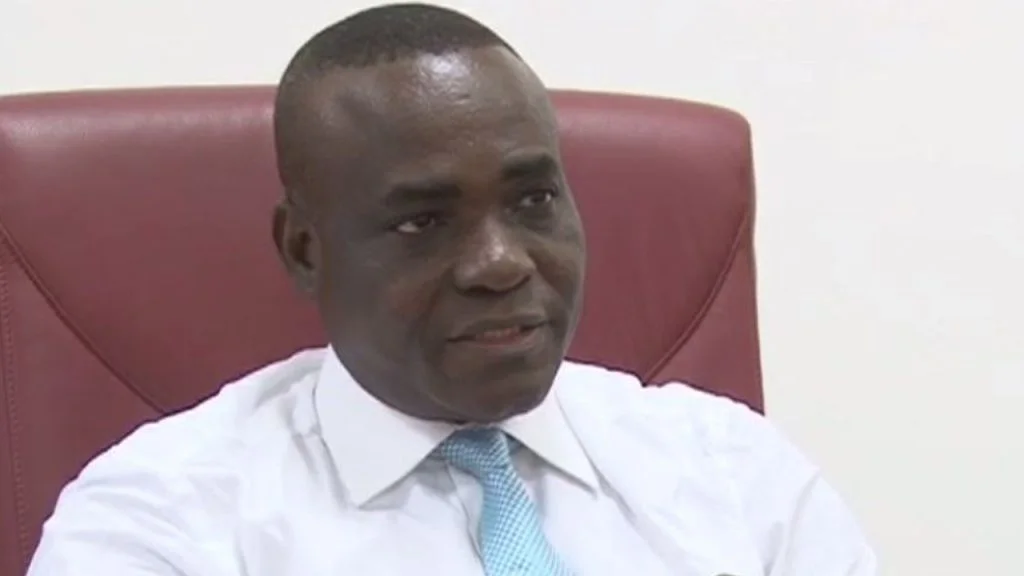News
Tension in Kano as Ganduje set for arraignment on April 17

Palpable fear and uncertainty have enveloped Kano as the government of Abba Kabir Yusuf moves to arraign the National Chairman of the All Progressives Congress, APC, and a former Governor of the State, Dr Umar Abdullahi Ganduje, over allegations of financial misappropriation.
Some residents are reportedly planning to vacate their homes for fear of mayhem by political thugs in the state.
The ruling New Nigeria People’s Party, NNPP, and the state government filed charges against Ganduje, his wife and six others at the Kano State High Court last Tuesday.
The NNPP-led administration in the state had last week launched an assault on two major grounds, a commission of Inquiry to probe Ganduje’s eight years tenure and litigation over alleged abuse of office.
Support for or against the impending litigation in the volatile city had dominated political discussion on local radio stations, and social media amid caution and threat.
Many residents who spoke over the current development expressed apprehension that the war may snowball into a security breach against the backdrop of deep-seated animosity between the feuding parties.
Yakubu Isa, a resident of Hotoro said, “I think the timing, and every other time isn’t the best to instigate a political war against one another, after all, the religion is against probe.”
Tanimu Auwalu of Rijiyallemo on his part advised Abba Kabir Yusuf to draw a line, and face governance to justify his mandate.
Rijiyallemo explained that “the government should preoccupy itself with the execution of blueprints instead of the needless war on political opponents.”
Hajiya Ayi isa Dosa on her part appealed to the governor to resist all forms of distraction because time is not on his side.
She stressed that “voters will be swayed by the level of infrastructure on ground than what Ganduje has done wrong.”
On his part, Garba Kore, a stalwart of the APC, in a radio interview that is being serialized in Kano warned that the governor’s action is not in good faith.
Kore accused the governor of “fighting a proxy war against a respected former governor”, stressing that “in the interest of equity and fairness, let them extend the Dr. Ganduje probe to cover his tenure as Kwankwaso’s deputy.”
Similarly, another APC chieftain, Alhaji Musa Iliyasu Kwankwaso, warned: “Let it be known to Governor Yusuf, that who is living inside a glass house should not throw stones, because the stone may eventually hit him”.
The Kano chapter of the APC in its official reaction by the tough-talking Chairman, Abdullahi Abbas, warned that “the party will continue to be law-abiding, it will not, however, condone witch-hunt, political victimisation, and persecution.”
Reacting to the exchange of fire by the feuding parties, the police in Kano said “The city is safe and will continue to make it safe for dwellers”.
Ussaini Gumel, the Commissioner of Police, in a telephone chat, explained that “police didn’t prepare charges against the former governor, in other words, we are out of it.
“The state government should speak on it, and I think the Attorney General is in a good stead to speak. But however, the city is safe for the citizens.”
CREDIT: DAILY POST
News
Nigeria s 1999 Constitution full of flaws – Muslim lawyers association

The Muslim Lawyers Association of Nigeria, MULAN, has declared that there are many defects and flaws in the current 1999 Constitution of the Federal Republic of Nigeria.
MULAN National President, Dr Kazeem Olajide Olaniyan, made this declaration while addressing a press conference to herald the 15th annual general conference of the association on Thursday in Ibadan, the Oyo State capital.
Olaniyan stressed that Nigeria needs a homegrown Constitution that will address the current challenges facing the country.

According to him, the 1999 Constitution was drafted during the military rule and has many defects and flaws.
He noted that a homegrown will address the current problems the country is facing.
Olaniyan while speaking further, maintained that the theme of the conference, ‘National Development: The new dynamics and nuances’, was chosen so as to provide solutions to the country’s problems.
He also used the medium to appeal to the government to address the issue of fuel scarcity, food crisis and inflation in the country.
“Any Constitution Nigeria must have must be homegrown. What we have now was drafted by the military.
“There are so many defects and flaws in the 1999 constitution.
“Removal of subsidy of petroleum has effect on all of us coupled with inflation. We are now experiencing fuel scarcity.
“As we speak, if we are blaming the government, there are so many things we as people are also causing. We are also calling on the government to address the problem of food insecurity.”
News
Court adjourns trial in Nigerian Govt versus Ali Bello, others to May 27

Senator Ita Enang, former Special Adviser to the President on National Assembly Matters, attributed the failure of the Nigerian economy, the escalating debt burden, and the depreciation of the national currency, the naira, to the National Assembly. Enang made these remarks during the public unveiling of Oversight Magazine, a publication dedicated to covering parliamentary events, by former House of Representatives member Aniekan Umannah.
Enang asserted that the National Assembly’s inability to pose pertinent inquiries was accountable for the economic challenges. Having chaired both the House and Senate Committees on Rules and Business, Enang criticized the chambers for never releasing reports on their oversight duties as required, nor for questioning the nation’s debt.
He highlighted that while lawmakers frequently conduct oversight visits to scrutinize the activities of Ministries, Departments, and Agencies, they neglect to present their findings for deliberation on the parliamentary floor. According to him, the executive’s suboptimal performance, at both state and national levels, can be attributed to the deficient oversight of the National Assembly and state Houses of Assembly nationwide.
Enang emphasized the importance of the oversight function, stating that it allows for monitoring the utilization of budget allocations, assessing project progress, and planning future budgets accordingly. He concluded that the failure of the Nigerian economy, the devaluation of the naira, and the excessive debt accumulation are ultimately the responsibility of the National Assembly.
News
NASS responsible for failure of Nigeria’s economy, rising debt – Ita Enang

Senator Ita Enang, former Special Adviser to the President on National Assembly Matters, attributed the failure of the Nigerian economy, the escalating debt burden, and the depreciation of the national currency, the naira, to the National Assembly. Enang made these remarks during the public unveiling of Oversight Magazine, a publication dedicated to covering parliamentary events, by former House of Representatives member Aniekan Umannah.
Enang asserted that the National Assembly’s inability to pose pertinent inquiries was accountable for the economic challenges. Having chaired both the House and Senate Committees on Rules and Business, Enang criticized the chambers for never releasing reports on their oversight duties as required, nor for questioning the nation’s debt.
He highlighted that while lawmakers frequently conduct oversight visits to scrutinize the activities of Ministries, Departments, and Agencies, they neglect to present their findings for deliberation on the parliamentary floor. According to him, the executive’s suboptimal performance, at both state and national levels, can be attributed to the deficient oversight of the National Assembly and state Houses of Assembly nationwide.
Enang emphasized the importance of the oversight function, stating that it allows for monitoring the utilization of budget allocations, assessing project progress, and planning future budgets accordingly. He concluded that the failure of the Nigerian economy, the devaluation of the naira, and the excessive debt accumulation are ultimately the responsibility of the National Assembly.
-

 World News7 months ago
World News7 months agoWhat we know about Israel’s war with Hamas
-

 Sports7 months ago
Sports7 months agoLaLiga: Everyone want to play with him – Vinicius on player Real Madrid should sign
-

 World News7 months ago
World News7 months agoIran calls on Islamic, Arab countries to confront Israel
-

 Tech7 months ago
Tech7 months agoTop 10 AI Skills to Learn in 2023
-

 Entertainment7 months ago
Entertainment7 months agoBET Hip-Hop Awards: Black Sherif wins big as Burna Boy loses seven nominations
-

 Entertainment7 months ago
Entertainment7 months ago‘Black Panther’ star Lupita Nyong’o breaks up with boyfriend, Selema Masekela
-

 ICT8 months ago
ICT8 months agoApple Bows To EU, Unveils iPhone With USB-C Charger
-

 World News7 months ago
World News7 months agoZelensky seeks defences for winter on visit to NATO








